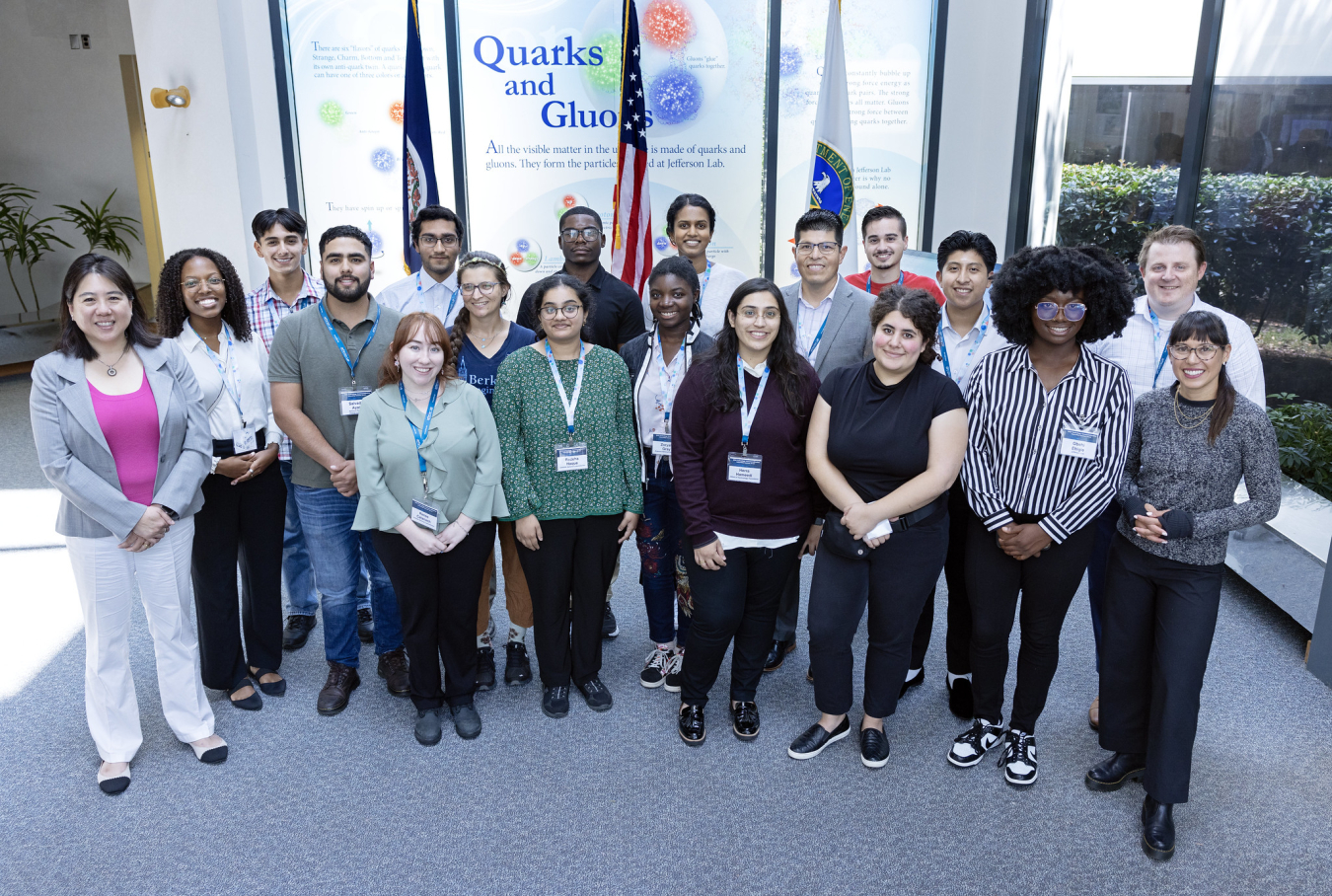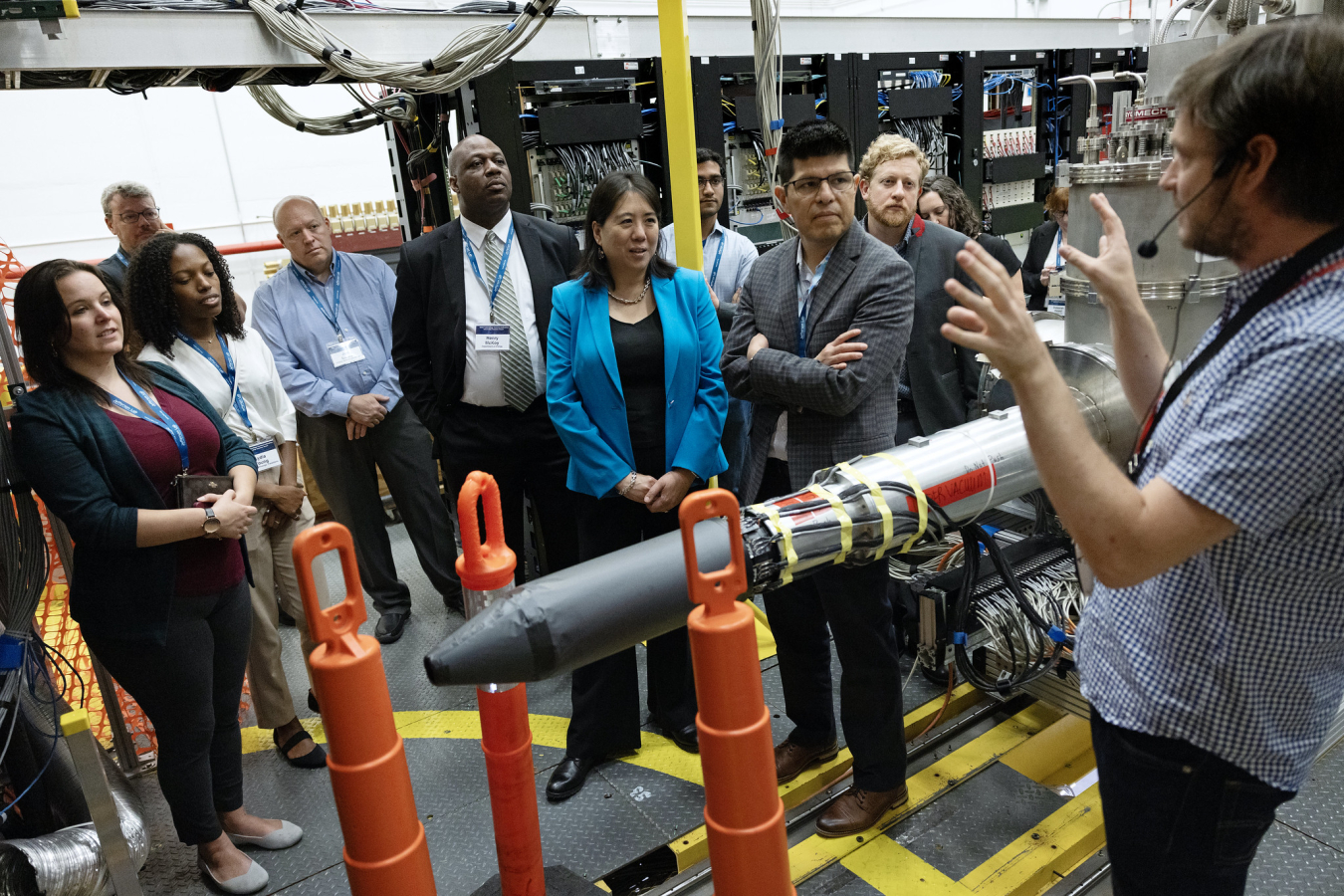Over three days, the interns delivered their final presentations, heard from DOE and lab leadership, toured Jefferson Laboratory, and celebrated their successes.
Office of Technology Transitions
August 25, 2023
On August 9, 2023, all 15 interns from the 2023 Technology Commercialization Internship Program (TCIP), led by the Department of Energy’s (DOE) Office of Technology Transitions (OTT), gathered at DOE’s Thomas Jefferson National Accelerator Facility (Jefferson Laboratory) for graduation week. Over three days, the interns delivered their final presentations, heard from DOE and lab leadership, toured Jefferson Laboratory, and celebrated their successes.
“The OTT internship program brings exceptional students into DOE and provides them with hands on experience that only our National Labs can offer.” said DOE Chief Commercialization Officer and Director of the Office of Technology Transitions Dr. Vanessa Z. Chan. “Many interns will go on to start a career within DOE.”
Throughout the 11-week program, the interns learned about cutting edge technologies in fields spanning machine learning and artificial intelligence, computing, data science, biofuels, energy, materials and more. While working with the National Labs, the students also undergo intensive training in commercialization through a condensed version of OTT’s Energy I-Corps curriculum. The program benefits students by enhancing their education, training them in entrepreneurship and energy technology related fields, and increasing their future marketability.
To conclude the program, the interns traveled to Jefferson Laboratory to present their individual work to a panel of OTT judges, their fellow interns, and National Lab staff. Zoryah Gray, an intern that was paired with Argonne National Laboratory, presented her work on Aeternal Upcycling, a start-up that was formed from research done at the lab. Aeternal Upcycling’s patented technology leverages hydrogenolysis to transform plastic waste into reusable material, potentially saving tens of millions of tons of plastic from incineration and landfills every year. The technology converts single-use plastic waste into key ingredients used in consumer items such as packaging, cosmetics, and more.

Each intern gave a 10-minute presentation on their work covering their technology, market and landscape analysis, and customer discovery research. The interns spoke enthusiastically of their learnings and appreciatively listened to one another's findings.
“The interns did amazing work this summer, one of them was even able to initiate a potential licensing agreement between their lab and a company they found during their customer discovery process. That could potentially take a licensing or business development associate at a lab weeks, or even months, to do normally. I am excited to see how they go into their respective fields and accelerate technology out of the lab and into the real world where we can benefit from it,” said Herra Hameedi, OTT TCIP Program Manager.
The judges convened to select the following winning presentations:
Individual Presentations
- First place: Zoryah Gray for the project "Market analysis and customer discovery for upcycling of single-use plastic waste". Zoryah worked with Argonne National Laboratory.
- Second place: Johnathan Russell for the project "Feasibility of wind interconnection standard platform (WISP)". Jonathan worked with Sandia National Laboratories.
- Third place: Radeha Haque for the project "Commercial and Industrial Customer Discovery for Edge-Connect Hermetic Headers and Connectors". Radeha worked with Sandia National Laboratories.
Group Presentations
- First place: team “GISMO Power”, led by Antonia Tahia Ginsberg-Klemmt (founder of GISMO Power), Arunabh Sarmah, and Alex Gutierrez Diaz.
- Runner-up: team “Aeromine”, led by Nathan Mitchell, Obehi Ehigie, and Meghana Karthic.
Jefferson Laboratory also invited the interns to tour Jefferson’s Continuous Electron Beam Accelerator Facility (CEBAF). CEBAF is based on superconducting radiofrequency (SRF) technology. It produces a stream of charged electrons that scientists use to probe the nucleus of the atom. CEBAF was the first large-scale application of SRF technology in the world. It is the world's most advanced particle accelerator for investigating the quark structure of the atom's nucleus.

The three-day event included several other standout presentations, including keynotes from Director of OTT, Dr. Vanessa Z. Chan, Director of DOE’s Office of State and Community Energy Programs, Dr. Henry McKoy, Director of Jefferson Lab, Dr. Stuart Henderson, and Jefferson Lab Deputy Director, Dr. David Dean.
A mixer was held on the second day to facilitate further collaboration between Jefferson Lab, OTT, and Jefferson Laboratory’s local technology community and to connect attendees to a wide array of OTT and industry opportunities, including the Energy I-Corps (EIC) program. EIC trains researchers at the National Laboratories, plants, and sites on market pathways for their technology. Carolina Villacis, OTT EIC Program Manager, encouraged lab researchers, industry experts, and interns to participate in a future cohort, “The technologies being invented at the National Labs can make impacts worldwide. However, the technologies need to be shared beyond the labs first. The Energy I-Corps program is the first step towards technology commercialization.”
The TCIP program will resume next summer. Students interested in technology commercialization and business development are encouraged to apply. For more information about TCIP, visit the program webpage. For the latest OTT news, sign up for email updates here and follow OTT on LinkedIn and Twitter.

